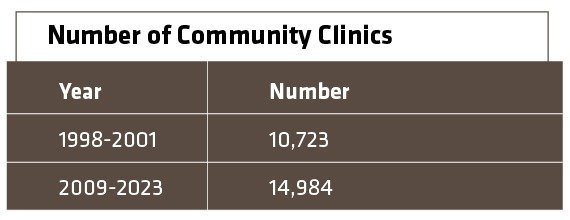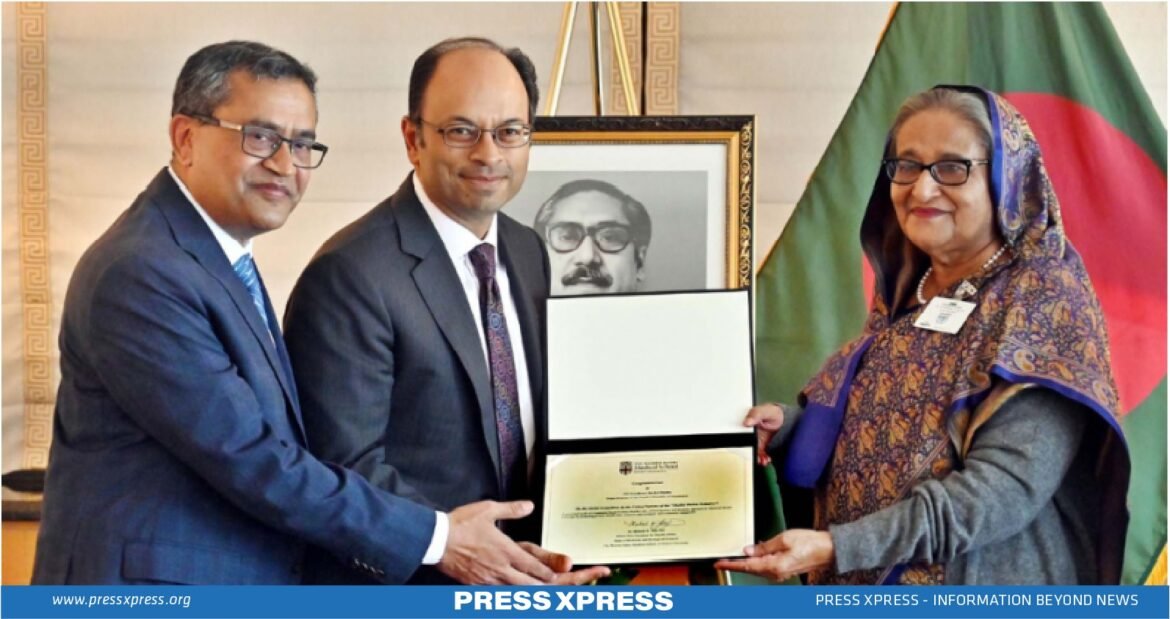The global acknowledgment underscores the success of the ‘community clinic model,’ the brainchild of the Prime Minister, in addressing healthcare disparities and enhancing healthcare availability for underserved populations.
Prime Minister Sheikh Hasina received a prestigious honor from Brown University in the United States for her remarkable contribution to healthcare services through the community clinic model on September 20, 2023. Hasina received the honor while attending the 78th session of the General Assembly of the United Nations.
This award highlights the global significance of Bangladesh’s healthcare initiative, which prioritizes primary healthcare, women’s empowerment, and community engagement.
The “Sheikh Hasina Initiative”
The honor, also known as the “Sheikh Hasina Initiative” demonstrates Bangladesh’s dedication to providing primary healthcare services to its citizens, especially in rural areas. Mukesh K. Jain, Dean of the School of Medicine and Biological Sciences at Brown University, presented the citation to Prime Minister Hasina at her palace of residence, The Lotte New York Hotel.
“The Warren Alpert Medical School of the Brown University has given the Prime Minister a special honor on her recognition by the United Nations for taking the initiative of community clinics,” PM’s Deputy Press Secretary Md. Noorelahi Mina told reporters.
YOU CAN ALSO READ: COMMUNITY CLINIC-HEALTHCARE AT PEOPLE’S DOORSTEP
“Congratulations to Her Excellency Sheikh Hasina, Prime Minister of the People’s Republic of Bangladesh on the recent recognition by the United Nations of the “Sheikh Hasina Initiative,” reads the citation. “A successful model of Community-based Primary Health Care: A Participatory and Inclusive Approach to Universal Health Coverage by promoting primary health care, women’s empowerment, and community engagement,” the citation added.
The Prime Minister praised the initiative and voiced her support for it. Sheikh Hasina emphasized the need for improving medical and clinical research in Bangladesh. “We’re always giving importance to research. It can play a great role in medical science research,” she said.
A remarkable progress of community clinics in Hasina’s era
In Bangladesh, community clinics have evolved into an innovative healthcare model, bridging the gap in rural areas. These clinics provide comprehensive services, such as prenatal and postnatal care, family planning, treatment for prevalent illnesses, and nutritional services. In addition, they contribute to the empowerment of women by providing essential healthcare and economic support. In 1996, when Prime Minister Sheikh Hasina assumed power, she inaugurated the first model community clinic, marking the commencement of the country’s universal healthcare system. These clinics gave underserved communities access to healthcare and were instrumental in reducing the distress caused by various diseases.
In 2001, however, a change in government led to the closure of these clinics, halting this progress. In 2009, following Sheikh Hasina’s return to power, the community clinic model was re-established and pursued with unwavering dedication.

Under Sheikh Hasina’s leadership, community clinics in Bangladesh have grown dramatically. There are currently over 14,000 community clinics in the country, each serving approximately 6,000 individuals. These clinics, particularly in underserved areas, have become a pillar of the nation’s healthcare system, filling critical voids in the public healthcare system. Efforts are currently being made to expand this network, thereby expanding access to healthcare services. The commitment to establishing the “Community Clinic Health Assistance Trust” by 2030 further demonstrates Bangladesh’s commitment to the Community Clinic Model’s sustainable growth.
This expansion aligns perfectly with Bangladesh’s commitment to the Sustainable Development Goals (SDGs), especially SDG-3, which seeks to assure healthy lives and promote the well-being of everyone. Bangladesh is not only securing its own healthcare future by expanding the Community Clinic Model, but it is also contributing to global efforts to attain universal health coverage and reduce health disparities.
How community clinics have helped in building a healthier nation?
The Community Clinic Model in Bangladesh has been a transformative force in promoting healthcare equity in rural and underserved areas. It has significantly decreased healthcare access disparities, relieving the financial burdens of vulnerable communities and enabling them to receive essential medical care and medications. In addition to empowering women through the provision of reproductive health and family planning services, this initiative has provided them with greater autonomy over their healthcare choices. These clinics offer comprehensive care, including, among others, services for maternal and infant health, family planning, injury treatment, and nutrition. Notably, approximately 4,000 community clinics across the nation offer maternity services.
During the COVID-19 pandemic, the Community Clinic Model demonstrated exceptional resilience and efficacy. It played a crucial role in facilitating vaccination campaigns in remote areas, protecting the health of disadvantaged populations. This adaptability and responsiveness demonstrate the model’s capacity to effectively respond to public health emergencies.
Budget allocation and sustainable growth
Finance Minister AHM Mustafa Kamal has allocated Tk36,863 crore in the national budget for the fiscal year 2023-2024, demonstrating a significant commitment to healthcare. This sizeable allocation aligns precisely with Bangladesh’s pursuit of health-related Sustainable Development Goals, which emphasize universal access to high-quality healthcare.
Expanding prioritized healthcare services, reducing out-of-pocket expenses, and encouraging greater participation in the healthcare system are pillars of the nation’s healthcare strategy.
The results of Bangladesh’s healthcare initiatives are remarkable. The Expanded Programme on Immunization (EPI) is an outstanding example, with a coverage rate of 94%, up from a mere 2% in 1985.
In addition, the Multi-Purpose Health Volunteer (MHV) Programme functions in 106 upazilas, providing quality healthcare services for 78 identified diseases via the SSK (Shasthyo Surokhsha Karmasuchi) benefits package.

Modernizing healthcare facilities, expanding bed capacities, and establishing specialized healthcare centers are additional commitments. The government also prioritizes maternal and infant healthcare, family planning services, and adolescent health, with ambitious plans for Youth-Friendly Corners and healthcare center renovations. These strategies include management of adolescent illness, nutrition programs, prevention of neonatal infection, and Kangaroo Mother Care (KMC) services for vulnerable infants.

In accordance with the Perspective Plan 2021-2041, the government intends to increase the quantity and caliber of healthcare professionals while modernizing medical and nursing education. In addition, plans call for the establishment of medical universities and new medical colleges, reinforcing the government’s unwavering dedication to advancing healthcare in Bangladesh.
Recognitions and achievements
Bangladesh’s Community Clinic Model has garnered international acclaim. In May 2023, the United Nations adopted a historic resolution titled “Community-Based Primary Health Care: A Participatory and Inclusive Approach to Achieving Universal Health Services.” This resolution not only acknowledged the critical role of community clinics in promoting primary healthcare, women’s empowerment, and community engagement but also referred to the initiative as “The Sheikh Hasina Initiative.” This recognition by the United Nations marked a watershed moment in global efforts to ensure healthcare access for all by 2030.
Beyond the United Nations resolution, Bangladesh’s Community Clinic Model has received accolades from various international entities and organizations. The World Health Organization (WHO) and other global health institutions have applauded the program’s success in extending primary healthcare services to all citizens, regardless of their location. This recognition highlights the model’s effectiveness in bridging healthcare gaps and improving healthcare access for marginalized communities.


